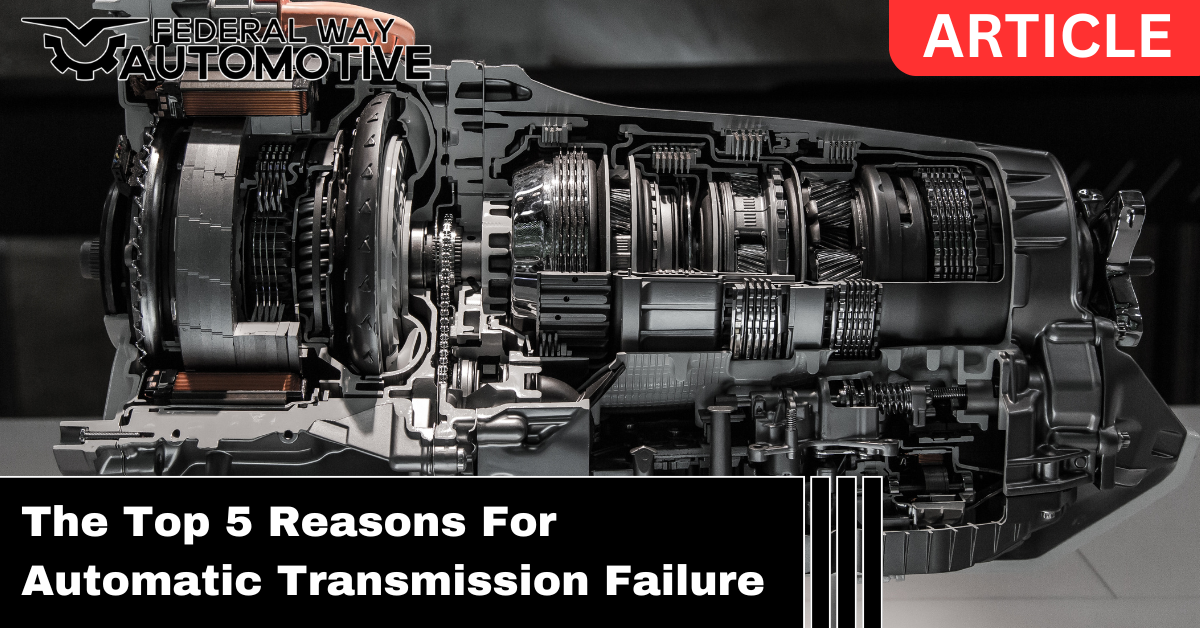Your transmission is one of the hardest-working components in your car. Every time you accelerate, slow down, or stop, it shifts gears to keep your vehicle running smoothly. But when something goes wrong, repairs can be expensive.
Many automatic transmission failures happen due to preventable issues. Neglecting maintenance, overheating, and contaminated fluid can all lead to serious damage. The good news? A little care goes a long way in keeping your transmission healthy.
At Federal Way Automotive, we’ve helped countless drivers avoid transmission failure by catching small problems before they turn into major repairs. Here’s what you need to know about the top five reasons transmissions fail—and how to prevent them.
1. Low or Contaminated Transmission Fluid
Think of transmission fluid as the lifeblood of your transmission. It keeps gears lubricated, prevents overheating, and ensures smooth shifting. However, when fluid levels drop or become contaminated, problems begin.
Why It Causes Transmission Failure
- Low fluid levels cause excess heat, breaking down seals and friction plates.
- Dirty or burnt fluid leads to slipping gears and sluggish shifting.
- Contaminated fluid allows debris to build up, which damages internal components.
How to Prevent It
- Check transmission fluid regularly. It should be bright red and have a clean smell.
- Schedule a transmission flush as recommended in your owner’s manual.
- Fix leaks immediately. Even a small leak can lower fluid levels quickly.
Ignoring fluid issues can result in complete transmission failure, leading to costly repairs or even a full rebuild.
2. Overheating and Excessive Heat Buildup
Heat is the #1 enemy of automatic transmissions. Excess heat causes fluid breakdown, metal warping, and seal damage. In fact, for every 20-degree rise in transmission fluid temperature, the lifespan of your transmission is cut in half.
Why It Causes Transmission Failure
- Overheating weakens internal seals, leading to leaks.
- High temperatures cause fluid to thin, reducing its ability to protect gears.
- Extreme heat warps metal components, affecting shifting performance.
How to Prevent It
- Monitor your transmission temperature. If it runs hot, have it checked immediately.
- Avoid towing beyond your vehicle’s limits. Overloading increases heat buildup.
- Schedule regular transmission flushes. Fresh fluid cools and protects the system.
Overheating is a silent killer. Catching it early can save you thousands in repairs.
3. Delayed or Neglected Maintenance
Many drivers assume transmissions are “sealed for life” and don’t require servicing. Unfortunately, that’s a myth. Skipping maintenance allows fluid contamination, sludge buildup, and internal wear to develop over time.
Why It Causes Transmission Failure
- Dirty fluid increases friction, leading to hard shifts.
- Worn-out filters allow debris to clog vital components.
- Ignoring small problems, like slipping or delayed shifting, lets damage spread.
How to Prevent It
- Follow manufacturer recommendations for transmission service intervals.
- Get a transmission flush every 30,000 to 60,000 miles, or as needed.
- Address shifting problems early. Small issues can turn into major failures.
Routine maintenance isn’t just about longevity—it prevents costly breakdowns before they happen.
4. Poor Driving Habits
Your driving style has a direct impact on transmission health. Certain habits can wear out gears, clutches, and solenoids faster, increasing the risk of failure.
Why It Causes Transmission Failure
- Hard acceleration and sudden stops put stress on internal parts.
- Towing beyond capacity forces the transmission to work harder, leading to overheating.
- Shifting into reverse or park before stopping damages clutch plates.
How to Prevent It
- Accelerate smoothly and avoid abrupt braking.
- Let your engine warm up before putting the transmission under load.
- Follow towing guidelines to avoid excessive strain.
Adjusting your driving habits now can save you from costly repairs later.
5. Faulty Transmission Solenoids and Internal Components
Modern automatic transmissions rely on electronic solenoids and hydraulic pressure to change gears. Over time, these components can fail due to wear, contamination, or electrical issues.
Why It Causes Transmission Failure
- Faulty solenoids cause delayed shifting or rough gear changes.
- Worn-out clutch plates lead to slipping and power loss.
- Internal pressure loss makes the transmission inoperable.
How to Prevent It
- Pay attention to unusual shifting behavior. Rough shifts or hesitation are warning signs.
- Check for dashboard warning lights. The transmission light signals potential issues.
- Keep up with maintenance. Clean fluid helps prevent solenoid and valve failures.
If shifting feels off, don’t ignore it—it could be a sign of a failing transmission.
Avoid Transmission Failure With Regular Service at Federal Way Automotive
A failing transmission doesn’t happen overnight. Most failures are the result of neglect, overheating, or contaminated fluid. The good news? You can prevent these problems with proper care.
At Federal Way Automotive, we provide:
✅ Transmission fluid checks and replacements
✅ Full transmission flush services
✅ Diagnostic inspections for shifting issues
✅ Leak detection and repairs
If you’re experiencing slipping gears, hard shifting, or strange noises, don’t wait. Schedule a transmission service today and avoid costly repairs down the road.


